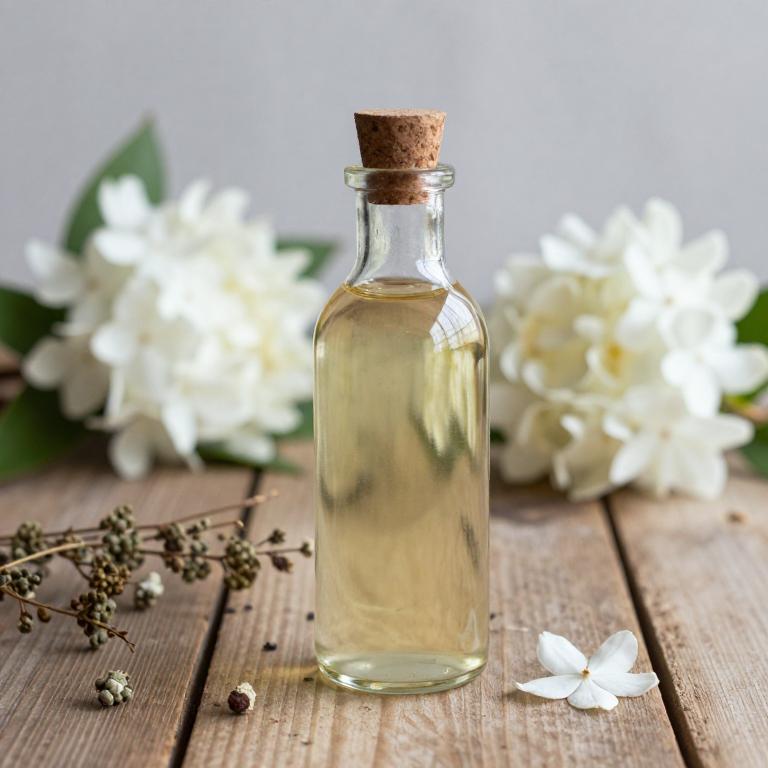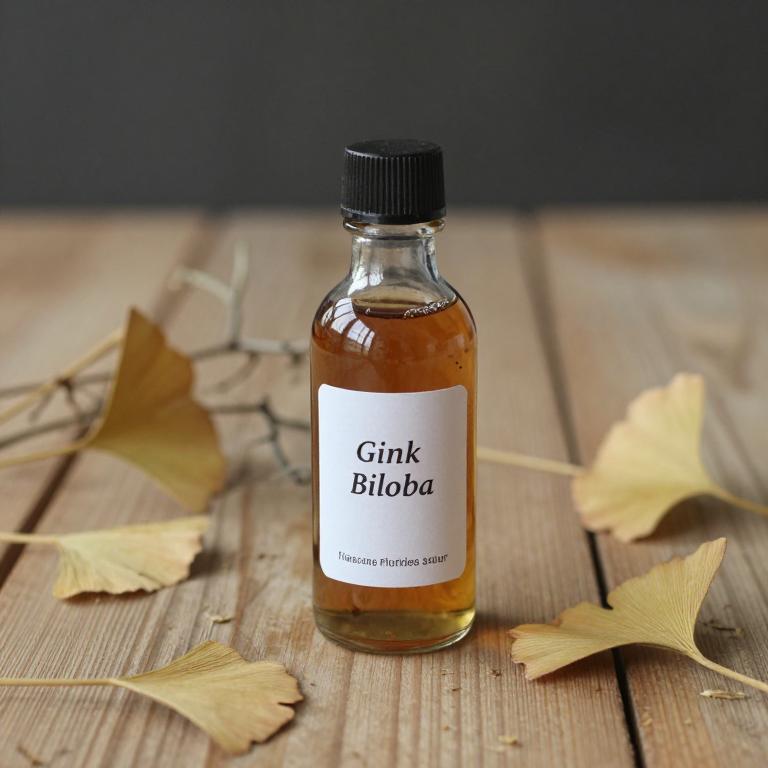10 Best Herbal Syrups For Nerve Pain

Herbal syrups have gained popularity as a natural alternative for managing nerve pain, offering a gentler approach compared to conventional pharmaceuticals.
These syrups often contain ingredients like turmeric, ginger, valerian root, and willow bark, which are known for their anti-inflammatory and pain-relieving properties. They work by reducing inflammation, improving blood circulation, and calming the nervous system, which can alleviate symptoms such as tingling, burning, and sharp pains. While herbal syrups are generally considered safe, it is important to consult a healthcare provider before use, especially for individuals with existing medical conditions or those taking other medications.
Overall, they can be a valuable complementary therapy when used under proper guidance.
Table of Contents
- 1. St. john's wort (Hypericum perforatum)
- 2. Salvia (Salvia officinalis)
- 3. Chaste tree (Vitex agnus-castus)
- 4. Echinacea (Echinacea purpurea)
- 5. White water lily (Nymphaea alba)
- 6. Turmeric (Curcuma longa)
- 7. Ginkgo (Ginkgo biloba)
- 8. Ginger (Zingiber officinale)
- 9. Valerian (Valeriana officinalis)
- 10. Yarrow (Achillea millefolium)
1. St. john's wort (Hypericum perforatum)

Hypericum perforatum, commonly known as St. John's Wort, has been traditionally used for its potential therapeutic effects on nerve pain.
Herbal syrups made from Hypericum perforatum are often prepared using the dried and crushed leaves and flowers of the plant, which are then steeped in a sugar-based solution to create a palatable and concentrated form of the herb. These syrups are believed to have anti-inflammatory and analgesic properties that may help alleviate symptoms of conditions such as neuropathy and fibromyalgia. However, it is important to note that while some studies suggest its efficacy, more clinical research is needed to confirm its effectiveness for nerve pain.
As with any herbal remedy, it should be used under the guidance of a healthcare professional due to potential interactions with other medications.
2. Salvia (Salvia officinalis)

Salvia officinalis, commonly known as sage, has been traditionally used for its medicinal properties, and its herbal syrup formulations are gaining attention for their potential role in alleviating nerve pain.
The active compounds in sage, such as rosmarinic acid and flavonoids, are believed to possess anti-inflammatory and neuroprotective effects that may help reduce nerve irritation and pain. Some studies suggest that sage extracts can modulate neurotransmitter activity, potentially offering relief for conditions like neuropathy and fibromyalgia. However, while preliminary research is promising, more clinical trials are needed to establish its efficacy and safety for nerve pain treatment.
As with any herbal remedy, it is advisable to consult a healthcare professional before incorporating sage syrup into a pain management regimen.
3. Chaste tree (Vitex agnus-castus)

Vitex agnus-castus, commonly known as chasteberry, has been traditionally used in herbal medicine for its potential calming and nerve-supporting properties.
Herbal syrups made from vitex are often formulated to help alleviate symptoms of nerve pain by promoting relaxation and reducing inflammation. These syrups are typically made by combining the dried berries with honey or other natural sweeteners, creating a palatable and easily absorbable form. Some studies suggest that vitex may influence hormonal balance, which can indirectly support nerve health and reduce pain sensitivity.
While more research is needed, many individuals find relief from nerve pain through the regular use of vitex-based herbal syrups as part of a holistic treatment approach.
4. Echinacea (Echinacea purpurea)

Echinacea purpurea, commonly known as purple coneflower, is traditionally used in herbal medicine for its immune-boosting properties, but recent studies suggest it may also have potential in alleviating nerve pain.
Herbal syrups made from Echinacea purpurea are often formulated with other complementary ingredients to enhance their therapeutic effects on neuropathic conditions. These syrups are typically taken orally and may help reduce inflammation and oxidative stress, which are often associated with nerve pain. While more research is needed to fully understand its efficacy, some users report relief from symptoms such as tingling, burning, and numbness.
As with any herbal remedy, it is important to consult a healthcare professional before using Echinacea purpurea syrup, especially for those with existing health conditions or taking other medications.
5. White water lily (Nymphaea alba)

Nymphaea alba, also known as white water lily, has been traditionally used in herbal medicine for its potential therapeutic properties.
Herbal syrups made from Nymphaea alba are believed to possess anti-inflammatory and analgesic effects, which may help alleviate nerve pain. These syrups are often prepared by extracting the roots or leaves and combining them with honey or other natural sweeteners. While some studies suggest that compounds in Nymphaea alba may support nerve health, more scientific research is needed to confirm its efficacy for nerve pain.
As a complementary therapy, Nymphaea alba herbal syrups may offer a natural alternative for individuals seeking relief from chronic nerve pain.
6. Turmeric (Curcuma longa)

Curcuma longa, commonly known as turmeric, has been traditionally used for its anti-inflammatory and antioxidant properties, and its herbal syrup formulations are increasingly being explored for the management of nerve pain.
The active compound curcumin in curcuma longa has shown potential in reducing inflammation and oxidative stress, which are often implicated in conditions like neuropathy. When prepared as a syrup, curcuma longa may offer a more palatable and consistent dosage compared to raw turmeric, enhancing its bioavailability. Some studies suggest that curcumin may help modulate pain signaling pathways, potentially offering relief for conditions such as sciatica or diabetic neuropathy.
However, while preliminary research is promising, more clinical trials are needed to fully establish its efficacy and safety for chronic nerve pain management.
7. Ginkgo (Ginkgo biloba)

Ginkgo biloba herbal syrup is a traditional remedy derived from the leaves of the ginkgo tree, known for its potential to improve circulation and support nervous system health.
It contains bioactive compounds such as flavonoids and terpenoids, which may help reduce inflammation and enhance blood flow to the nerves. Some studies suggest that ginkgo biloba may alleviate symptoms of nerve pain, such as those associated with neuropathy, by promoting neuroprotection and reducing oxidative stress. While it is generally considered safe, it is important to consult a healthcare provider before use, especially for individuals taking other medications.
As with any herbal remedy, the effectiveness of ginkgo biloba syrup can vary, and it should not replace prescribed treatments for severe nerve pain.
8. Ginger (Zingiber officinale)

Zingiber officinale, commonly known as ginger, has been traditionally used for its anti-inflammatory and analgesic properties, making it a potential natural remedy for nerve pain.
Ginger herbal syrups are often prepared by extracting the active compounds from fresh or dried ginger root and combining them with sweeteners and other herbal ingredients to create a palatable formulation. These syrups may help reduce inflammation and oxidative stress, which are often associated with conditions like neuropathy and sciatica. While scientific evidence supporting their efficacy for nerve pain is limited, some studies suggest that ginger can modulate pain pathways and improve circulation.
As a complementary therapy, ginger herbal syrups may offer a gentle, natural option for managing mild to moderate nerve pain, though they should not replace medical advice or prescribed treatments.
9. Valerian (Valeriana officinalis)

Valeriana officinalis, commonly known as valerian, is a herbal remedy that has been traditionally used to alleviate nerve pain due to its calming and sedative properties.
Valerian root extract, often incorporated into herbal syrups, contains compounds such as valerenic acid and essential oils that may help reduce inflammation and calm overactive nerve signals. These syrups are typically taken orally and are favored for their mild side effect profile compared to pharmaceutical pain medications. However, while some studies suggest potential benefits, more rigorous clinical research is needed to fully understand their efficacy for nerve pain.
As with any herbal supplement, it is advisable to consult with a healthcare provider before use, especially for individuals with existing medical conditions or those taking other medications.
10. Yarrow (Achillea millefolium)

Achillea millefolium, commonly known as yarrow, has been traditionally used for its potential therapeutic properties, and some herbal syrups containing this plant are being explored for their ability to alleviate nerve pain.
These syrups are often prepared by combining yarrow with other herbs known for their anti-inflammatory and analgesic effects, such as willow bark or valerian root. While scientific evidence supporting the efficacy of yarrow-based syrups for nerve pain is limited, some users report reduced discomfort and improved nerve function after regular use. It is important to note that these syrups should be used under the guidance of a healthcare professional, as they may interact with other medications or have side effects in certain individuals.
Overall, yarrow herbal syrups may offer a natural alternative for managing nerve pain, but further research is needed to confirm their effectiveness and safety.